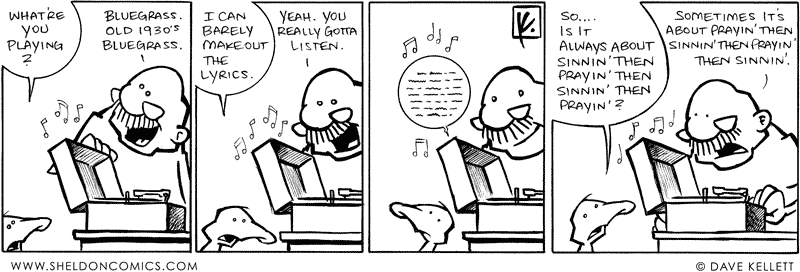
Yesterday I had the regular pleasure of meeting with an academic and administrative colleague who is also an Episcopal priest. (We share a fair amount in common, as you can tell.) Understandably our discussion turned towards how I and my family are coping nearly ten months after Mack’s death. One topic in particular we dwelt upon was the envisioning of heaven. I have written elsewhere on this blog of my “back of the napkin” concept of time, the universe, and the resurrection. This friend and I had both recently listened to Craig Koester’s “Great Course” on Revelation. [mfn]As an aside, I noticed that in the first episode of Sleepy Hollow they said “RevelationS” but in later episodes they corrected themselves.[/mfn] It is an excellent discussion of Revelation and its impact on Western history. We both agreed that while we are given lots of detailed imagery about heaven, it is also just that, imagery.
Long ago, guided by Pheme Perkins when she was visiting professor at Cornell in my senior year, I came to the conclusion that, like Gen. 1-3, Revelation is intended to convey truths rather than details, essentials rather than specifics. Genesis is not a “guide on how to create your own cosmos” any more than Revelation is a checklist of things to look for in the End of Days. But just as Genesis clearly asserts the fundamental truths that God created this cosmos (mechanical means are irrelevant) and us, specifically so that we might be in relationship with God, one another and creation, so too does Revelation convey the truth that life continues beyond this mortal world, there will be justice, and God’s order will prevail. Exactly how that happens and what it will all look like is not terribly relevant. [mfn]To try another analogy, might we say it is a bit like spelling? We have conventions of how we expect words to be splled, bt we cn steel unnerstan what is ment evn when convntn isnt fllwed.[/mfn]
Coincidentally I came across this article shared on Facebook. Christian, Not Conservative: Why Marilynne Robinson’s literary—and liberal—Calvinism appeals. While my wife was very familiar with Marilynne Robinson, I have to admit I did not know her work or anything about her. The article is largely about her political views, as we might expect in an article from The American Conservative, but it also dips into theology quite a bit because clearly her Christian faith informs her work and her politics. At one point they address her views on “the Second Coming.”
I expect to be very much surprised by the Second Coming. I would never have imagined the Incarnation or the Resurrection. To be astonishing seems to be the mark of God’s great acts—who could have imagined Creation? On these grounds it seems like presumption to me to treat what can only be speculation as if it were even tentative knowledge. I expect the goodness of God and the preciousness of Creation to be realized fully and eternally. I expect us all to receive a great instruction in the absolute nature of grace.
This is where I too find myself. How could we have imagined the incarnation? The resurrection made little sense and was not expected by anyone. So we should not be surprised that we cannot fully imagine, let along comprehend, what and how that the transition from this life to the next, from partial to full, will occur? [pullquote]I expect the goodness of God and the preciousness of Creation to be realized fully and eternally.[/pullquote]
I have often noted in teaching Psalms, especially when dealing with difficult passages like Ps. 137, that a major role of Psalms we often overlook is that they teach us it is OK to pray openly and honestly with God. We are allowed to be bitter and angry and to call God to account for our distress. (We ought not to stay in those places. Psalms teaches us that as well.) In a similar manner we tend to overlook the fact that Revelation is really a work of exhortation and encouragement. It is written to a people who are scared and harassed to tell them that it will be OK. We have to lift our eyes from this short horizon and consider the longer and larger view. When we do we will see that God remains God and that this creation, His Creation, is just the beginning. Details, shmetials. That is not what Revelation is about. It is about God’s justice, grace, and mercy.





8 thoughts on “New perspectives on the future, Revelation, the Second Coming, and all that.”
Its not clear what is seen to be difficult about Ps 137. God is the God of all, except those who reject Him- they are afforded their wish of carrying on in rebellion, and are so permitted.
God was not the God of Babylon, nor the God of the Edomites who had rejected Him, but the God of His chosen, which is why Psa 147:20 says what it does. So long as God is starting His new creation with Zion rather then Babylon, Ps 137 reads just fine.
Vince,
First, I would say that God is the God of all, even those who reject him. They might not recognize him as their God, but if he is the God of all, creator of the universe, etc. then he is indeed God of them as well.
Second, most people find Ps. 137:9 disturbing, to say the least:
The Bible clearly states that we are to love our neighbors as ourselves (Lev. 19:18 and Mark 12:31 and parallels) and the parable of the Good Samaritan, among others, make it clear that Jesus taught that even our enemies we are to love. He makes it explicit in Matt. 5:44.
As a result, most find verse 9 of Ps. 137 deeply troubling. It is saying that those who would kill the innocent babies of the Edomites and Babylonians are to be blessed! That does not seem to jive with the rest of the biblical teachings, in both Testaments.
Now many modern commentators find ways around that which I think are unsatisfying. They either reject the text as being wicked and vengeful because it was “pre-Jesus” (and so those poor Israelites didn’t know any better) or simply reject it on the basis of an underlying belief that Scripture itself is a human product and thus we can accept or reject as we like. Today’s sensibilities tell us that this is a horrible attitude to have and so we must reject (and omit from our lectionaries) any such texts.
As I suggest in my post above, the proper way of both accepting this text and understanding it is to realize that it is human experience, suffering, and pain being expressed. That does not mean it is the will of God. But the fact that it is Canon does mean that we too should be willing and feel comfortable expressing to God our deepest and most sincere feelings, even if (perhaps especially if) they are not in keeping with what God wishes for us.